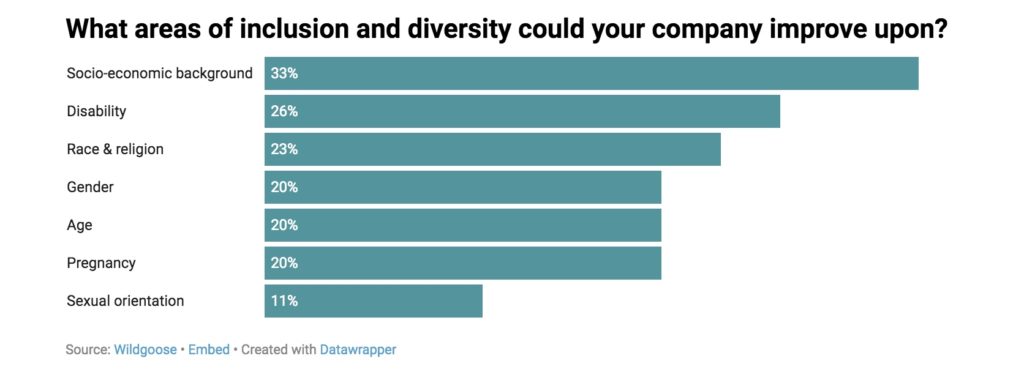A new report has revealed that classism is currently the most prevalent diversity-related problem in UK workplaces.
Classism exists in more than half of UK’s workplaces, and has been experienced by a third of its employees, according to the 2022 Diversity & Inclusion in the Workplace Report, from team building experts Wildgoose. Additionally, 57% of employees have witnessed discrimination or a lack of inclusivity whilst at work over the last year.
CLASSISM AT WORK
The report highlighted the need to tackle widespread ‘classism’, with a third of UK companies needing to improve on their levels of socio-economic diversity and inclusion. The likelihood of experiencing classism at work differs depending on where you are in the UK. Around half (50%) of employees working at Scottish companies identified classism as a key issue. This falls to 44% of employees in London, and 40% in the North East.
These findings echo the results of a Queen Mary University study, which found that a quarter (25%) of UK workers had been mocked, criticised, or singled out for their accent. The rate rose even higher to 29% among senior managers from working-class backgrounds.

WORKPLACE CLASSISM-CEILING
So what does workplace classism look like? Classism can take the everyday form of mocking accents, and can have career-long impacts for employees. This includes being underpaid compared to colleagues, or halting progression into top jobs. It’s estimated that working-class people in the UK earn, on average, £6,800 per year (around 17%) less than their middle-class colleagues in elite sectors like finance, medicine and law.
Classism has become a more prevalent issue since 2019, noted the survey. When employees were asked what areas of diversity their company could improve upon, socio-economic diversity ranked as a top area of concern as the above chart indicates, compared to three years ago, when it ranked below disability, race and religion.

The survey also revealed that for 73% of employees who were discriminated against (for any reason), the problem wasn’t dealt with adequately by the company.
“It’s quite shocking to discover that classism exists in more than half of the UK’s workplaces. That’s a lot of businesses where people are disadvantaged because of their background,” stated Wildgoose Managing Director Jonny Edser.
CREATING A LEVEL PLAYING FIELD
With a potential recession around the corner, businesses will be looking to optimise performance as much as possible. “One way to do this is by making sure they’re a meritocracy, where people can make the most of their abilities and rise regardless of their background,” added Edser. “By combating discrimination, they’ll also be creating a more harmonious working environment and higher job satisfaction.”
With so many workplaces suffering from class divisions, “it’s important that companies make efforts to bring their people together”, according to Edser. “We know how effective social activities can be in forming bonds between colleagues and creating a level playing field. And that has to be the aim: to make employees realise they’re all equal.”
Click here to read the full report.







































